| Listing 1 - 6 of 6 |
Sort by
|
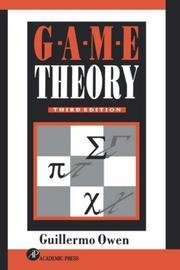
ISBN: 9780125311519 0125311516 Year: 2001 Publisher: San Diego: Academic press,
Abstract | Keywords | Export | Availability | Bookmark
 Loading...
Loading...Choose an application
- Reference Manager
- EndNote
- RefWorks (Direct export to RefWorks)
Game theory --- 519.3 --- Games, Theory of --- Theory of games --- Mathematical models --- Mathematics --- 519.83 --- 519.83 Theory of games --- Operational research. Game theory --- Game Theory. --- Game Theory
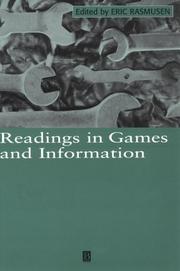
ISBN: 0631215573 9780631215578 Year: 2001 Publisher: Oxford: Blackwell,
Abstract | Keywords | Export | Availability | Bookmark
 Loading...
Loading...Choose an application
- Reference Manager
- EndNote
- RefWorks (Direct export to RefWorks)
Operational research. Game theory --- Game theory --- 330.105 --- 519.83 --- Games, Theory of --- Theory of games --- Mathematical models --- Mathematics --- Wiskundige economie. Wiskundige methoden in de economie --- 519.83 Theory of games --- 330.105 Wiskundige economie. Wiskundige methoden in de economie
Book
ISBN: 0262267217 0585475482 9780262267212 9780585475486 Year: 2001 Volume: 2 Publisher: Cambridge, Mass. MIT Press
Abstract | Keywords | Export | Availability | Bookmark
 Loading...
Loading...Choose an application
- Reference Manager
- EndNote
- RefWorks (Direct export to RefWorks)
A conceptual and analytical framework for understanding economic institutions and institutional change.Markets are one of the most salient institutions produced by humans, and economists have traditionally analyzed the workings of the market mechanism. Recently, however, economists and others have begun to appreciate the many institution-related events and phenomena that have a significant impact on economic performance. Examples include the demise of the communist states, the emergence of Silicon Valley and e-commerce, the European currency unification, and the East Asian financial crises.In this book Masahiko Aoki uses modern game theory to develop a conceptual and analytical framework for understanding issues related to economic institutions. The wide-ranging discussion considers how institutions evolve, why their overall arrangements are robust and diverse across economies, and why they do or do not change in response to environmental factors such as technological progress, global market integration, and demographic change.
Institutional economics. --- Game theory. --- Economic Theory --- Business & Economics --- Games, Theory of --- Theory of games --- Mathematical models --- Mathematics --- Economics --- ECONOMICS/Game Theory --- ECONOMICS/Political Economy
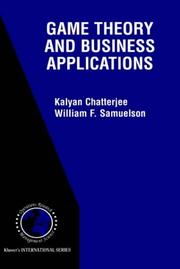
ISBN: 0792373324 9786610200566 1280200561 0306475685 9780792373322 Year: 2001 Volume: 35 Publisher: Boston: Kluwer Academic Publishers,
Abstract | Keywords | Export | Availability | Bookmark
 Loading...
Loading...Choose an application
- Reference Manager
- EndNote
- RefWorks (Direct export to RefWorks)
In the last twenty-five years, game theory has been applied to a growing number of practical problems: from antitrust analysis to monetary policy; from the design of auction institutions to the structuring of incentives within firms; from patent races to dispute resolution. The purpose of Game Theory and Business Applications is to expand these applications of game theory into a broad and meaningful view of the way business decisions can be modelled and analyzed. The chapter contents embrace a wide variety of business functions - from accounting to finance, to operations, to strategy, and to organizational design. In addition, specific application areas include numerous kinds of market competition, bargaining, auctions and competitive bidding. All of these applications involve competitive decision settings, specifically situations where a number of economic agents in pursuit of their respective self-interests take actions that together affect all of their fortunes. In the language of game theory, players take actions consistent with the given `rules of the game,' and these joint actions determine final outcomes and payoffs. As this volume demonstrates, game theory provides a compelling guide for business strategy. The first section of this volume discusses game-theoretic applications in four functional areas of business: finance, accounting, operations management and information systems, and organization design. The second section considers competitive strategies in `imperfect' markets. Using cooperative and non-cooperative game-theoretic approaches, these four chapters consider various topics: spatial competition, signaling of product quality, trust and cooperation in ongoing relationships, strategic behavior in bargaining, and the `balance of power' between the firm and its buyers and suppliers. The last section of the book deals in detail with auctions and competitive bidding institutions. The emphasis is on the contributions of game theory to both auction theory and practice. Topics considered include optimal auctions, bidder collusion, and the design of institutions for selling the radio spectrum and trading electrical power.
Game theory. --- Decision Making. --- Management. --- Organization theory --- Operational research. Game theory --- 519.83 --- Game theory --- Decision making --- Management --- Administration --- Industrial relations --- Organization --- Deciding --- Decision (Psychology) --- Decision analysis --- Decision processes --- Making decisions --- Management decisions --- Choice (Psychology) --- Problem solving --- Games, Theory of --- Theory of games --- Mathematical models --- Mathematics --- 519.83 Theory of games --- Decision making. --- Operations research. --- Operations Research/Decision Theory. --- Operational analysis --- Operational research --- Industrial engineering --- Management science --- Research --- System theory
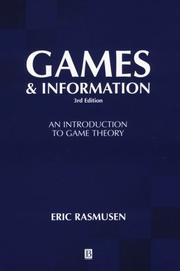
ISBN: 0631210954 Year: 2001 Publisher: Cambridge, Mass. Blackwell
Abstract | Keywords | Export | Availability | Bookmark
 Loading...
Loading...Choose an application
- Reference Manager
- EndNote
- RefWorks (Direct export to RefWorks)
330.105 --- 330.1 --- 519.83 --- Game theory --- Games, Theory of --- Theory of games --- Mathematical models --- Mathematics --- 519.83 Theory of games --- 330.1 Economische grondbegrippen. Algemene begrippen in de economie --- Economische grondbegrippen. Algemene begrippen in de economie --- 330.105 Wiskundige economie. Wiskundige methoden in de economie --- Wiskundige economie. Wiskundige methoden in de economie --- 519.3 --- 305.6 --- AA / International- internationaal --- Risicotheorie, speltheorie. Risicokapitaal. Beslissingsmodellen --- Operational research. Game theory --- Game theory.
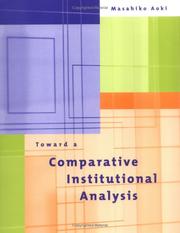
ISBN: 0262011875 9780262011877 Year: 2001 Volume: 2 Publisher: Cambridge, Mass.: MIT Press,
Abstract | Keywords | Export | Availability | Bookmark
 Loading...
Loading...Choose an application
- Reference Manager
- EndNote
- RefWorks (Direct export to RefWorks)
Microeconomics --- Economic schools --- Institutional economics --- Game theory --- AA / International- internationaal --- 330.48 --- 338.040 --- 330 --- Games, Theory of --- Theory of games --- Mathematical models --- Mathematics --- Economics --- Neo-klassiekers en andere post-keynesiaanse theorieën. Public choice. Institutionalisten. Home economics. Analyseschool van de transactiekosten. --- Ondernemingen: algemeenheden. --- Neo-klassiekers en andere post-keynesiaanse theorieën. Public choice. Institutionalisten. Home economics. Analyseschool van de transactiekosten --- Ondernemingen: algemeenheden
| Listing 1 - 6 of 6 |
Sort by
|

 Search
Search Feedback
Feedback About UniCat
About UniCat  Help
Help News
News